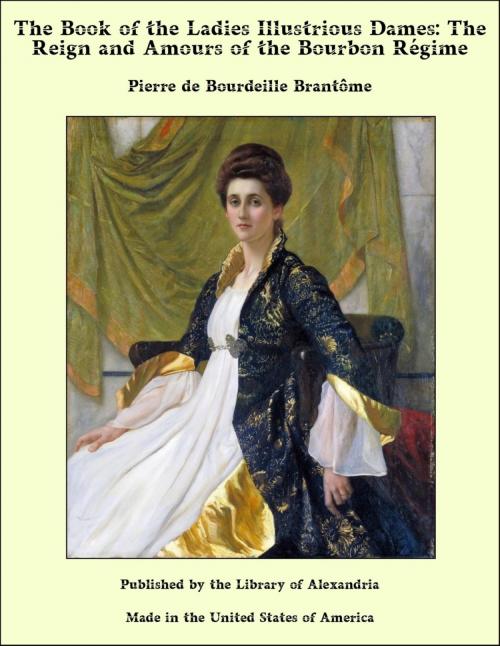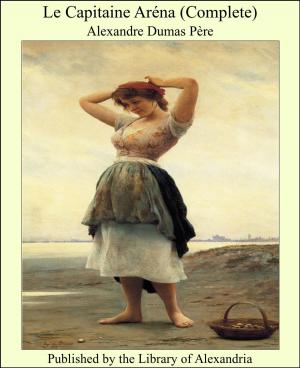The Book of the Ladies Illustrious Dames: The Reign and Amours of the Bourbon Régime
Nonfiction, Religion & Spirituality, New Age, History, Fiction & Literature| Author: | Pierre de Bourdeille Brantôme | ISBN: | 9781465611093 |
| Publisher: | Library of Alexandria | Publication: | March 8, 2015 |
| Imprint: | Language: | English |
| Author: | Pierre de Bourdeille Brantôme |
| ISBN: | 9781465611093 |
| Publisher: | Library of Alexandria |
| Publication: | March 8, 2015 |
| Imprint: | |
| Language: | English |
This Queen Anne was the rich heiress of the duchy of Bretagne, which was held to be one of the finest of Christendom, and for that reason she was sought in marriage by the greatest persons. M. le Duc d’Orléans, afterwards King Louis XII., in his young days courted her, and did for her sake his fine feats of arms in Bretagne, and even at the battle of Saint Aubin, where he was taken prisoner fighting on foot at the head of his infantry. I have heard say that this capture was the reason why he did not espouse her then; for thereon intervened Maximilian, Duke of Austria, since emperor, who married her by the proxy of his uncle the Prince of Orange in the great church at Nantes. But King Charles VIII., having advised with his council that it was not good to have so powerful a seigneur encroach and get a footing in his kingdom, broke off a marriage that had been settled between himself and Marguerite of Flanders, took the said Anne from Maximilian, her affianced, and wedded her himself; so that every one conjectured thereon that a marriage thus made would be luckless in issue. Now if Anne was desired for her property, she was as much so for her virtues and merits; for she was beautiful and agreeable; as I have heard say by elderly persons who knew her, and according to her portrait, which I have seen from life; resembling in face the beautiful Demoiselle de Châteauneuf, who has been so renowned at the Court for her beauty; and that is sufficient to tell the beauty of Queen Anne as I have heard it portrayed to the queen-mother [Catherine de’ Medici]. Her figure was fine and of medium height. It is true that one foot was shorter than the other the least in the world; but this was little perceived, and hardly to be noticed, so that her beauty was not at all spoilt by it; for I myself have seen very handsome women with that defect who yet were extreme in beauty, like Mme. la Princesse de Condé, of the house of Longueville. So much for the beauty of the body of this queen. That of her mind was no less, because she was very virtuous, wise, honourable, pleasant of speech, and very charming and subtile in wit. She had been taught and trained by Mme. de Laval, an able and accomplished lady, appointed her governess by her father, Duc François. For the rest, she was very kind, very merciful, and very charitable, as I have heard my own folks say. True it is, however, that she was quick in vengeance and seldom pardoned whoever offended her maliciously; as she showed to the Maréchal de Gié for the affront he put upon her when the king, her lord and husband,lay ill at Blois and was held to be dying. She, wishing to provide for her wants in case she became a widow, caused three or four boats to be laden on the River Loire with all her precious articles, furniture, jewels, rings and money,—and sent them to her city and château of Nantes. The said marshal, meeting these boats between Saumur and Nantes, ordered them stopped and seized, being much too wishful to play the good officer and servant of the Crown. But fortune willed that the king, through the prayers of his people, to whom he was indeed a true father, escaped with his life.
This Queen Anne was the rich heiress of the duchy of Bretagne, which was held to be one of the finest of Christendom, and for that reason she was sought in marriage by the greatest persons. M. le Duc d’Orléans, afterwards King Louis XII., in his young days courted her, and did for her sake his fine feats of arms in Bretagne, and even at the battle of Saint Aubin, where he was taken prisoner fighting on foot at the head of his infantry. I have heard say that this capture was the reason why he did not espouse her then; for thereon intervened Maximilian, Duke of Austria, since emperor, who married her by the proxy of his uncle the Prince of Orange in the great church at Nantes. But King Charles VIII., having advised with his council that it was not good to have so powerful a seigneur encroach and get a footing in his kingdom, broke off a marriage that had been settled between himself and Marguerite of Flanders, took the said Anne from Maximilian, her affianced, and wedded her himself; so that every one conjectured thereon that a marriage thus made would be luckless in issue. Now if Anne was desired for her property, she was as much so for her virtues and merits; for she was beautiful and agreeable; as I have heard say by elderly persons who knew her, and according to her portrait, which I have seen from life; resembling in face the beautiful Demoiselle de Châteauneuf, who has been so renowned at the Court for her beauty; and that is sufficient to tell the beauty of Queen Anne as I have heard it portrayed to the queen-mother [Catherine de’ Medici]. Her figure was fine and of medium height. It is true that one foot was shorter than the other the least in the world; but this was little perceived, and hardly to be noticed, so that her beauty was not at all spoilt by it; for I myself have seen very handsome women with that defect who yet were extreme in beauty, like Mme. la Princesse de Condé, of the house of Longueville. So much for the beauty of the body of this queen. That of her mind was no less, because she was very virtuous, wise, honourable, pleasant of speech, and very charming and subtile in wit. She had been taught and trained by Mme. de Laval, an able and accomplished lady, appointed her governess by her father, Duc François. For the rest, she was very kind, very merciful, and very charitable, as I have heard my own folks say. True it is, however, that she was quick in vengeance and seldom pardoned whoever offended her maliciously; as she showed to the Maréchal de Gié for the affront he put upon her when the king, her lord and husband,lay ill at Blois and was held to be dying. She, wishing to provide for her wants in case she became a widow, caused three or four boats to be laden on the River Loire with all her precious articles, furniture, jewels, rings and money,—and sent them to her city and château of Nantes. The said marshal, meeting these boats between Saumur and Nantes, ordered them stopped and seized, being much too wishful to play the good officer and servant of the Crown. But fortune willed that the king, through the prayers of his people, to whom he was indeed a true father, escaped with his life.















